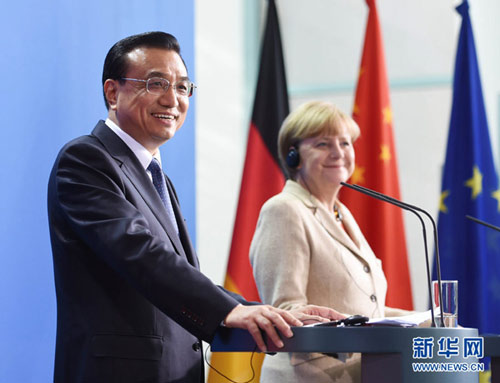當前位置: Language Tips> 雙語新聞
German, Chinese leaders meet amid gloomy economic backdrop
分享到

|
The third German-Chinese ministerial consultations are due to be held in Berlin. They come amid growing concerns over Europe's faltering economy and an economic slowdown in China. When Chinese Prime Minister Li Keqiang arrives in Germany for high-level consultations beginning Friday, it will be amidst a mixed background of flourishing trade between the two economic powerhouses but gloomy forecasts for their growth. Li will hold talks with German Chancellor Angela Merkel and sign a number of agreements. The two leaders will also preside over a joint meeting of their cabinets. Bilateral trade between the two countries has jumped nearly 12-fold in recent years, according to official data. But elation over the Sino-German trade boom has been dampened by a slowdown in the Chinese economy and warnings that Germany is teetering on the brink of recession. "The Chinese economy is now not strong enough to offset stagnation in the eurozone," said Carsten Brzeski, an economist with ING Bank. Domestic demand in China has slipped. Imports dropped 3 percent in August over July and as a result Germany no longer looks like it will be able to prop up the eurozone economy like it did when it led the Continent out of the 2009 recession. On Thursday, Germany's Federal Statistics Office marked the sharpest monthly drop in exports in five years. There have also been declines in industrial production, factory orders and business confidence. What seemed years ago to be an insatiable Chinese demand for high-end products from Germany has since slowed as China no longer registers the whopping, double-digit growth rates it once did. The International Monetary Fund even forecast this week growth in China could slow to 7.1 percent by next year. Yet China is still Germany's third largest trading partner. In 2013, bilateral trade topped 140 billion euros ($178.1 billion) - up from 12 billion euros in 1993. Outside Europe, China was the second most important market for German exports, behind the United States. And some only expect that number to go up. "We are counting on 2014 being a record year for bilateral trade," China's ambassador to Germany, Shi Mingde, said earlier this month. But Shi also voiced concern over falling European demand for goods produced in China as geopolitical tensions around the world have unnerved investors and caused business confidence to drop. Pro-democracy demonstrations in Hong Kong, the ongoing conflict in Ukraine, rapid advances by Islamic State militants in Iraq and Syria and the outbreak of the deadly Ebola virus have spoiled appetites for loans and investment the world over. "We don't want the entire EU to dip into a recession," Shi said. "At the moment, we're feeling lower demand from Europe - that's a problem for us." While Li and Merkel convene in Berlin, around 550 business leaders will gather in the northern German port city of Hamburg for the sixth biennial "China meets Europe" summit, where Li will also make a speech. More Chinese companies are based there than in any other German or European city and perhaps nowhere else are the effects of Germany's slowing mercantile relationship with China more apparent. This month, a German court postponed a ruling on deepening the channels leading to Hamburg's ports - a major blow to a city eager to accommodate a new generation of Chinese container ships. |
據德國之聲網站10月9日報道,第三次中德部長級磋商將在德國首都柏林召開。此時,整個歐洲經濟搖搖欲墜,而中國經濟增速也在放緩,讓外界愈發擔憂。 在中德這兩大經濟強國的雙邊貿易繁榮,而對兩國經濟增長預期卻走低的復雜背景下,中國總理李克強于抵達德國,并參加在10日與德方的高級磋商。 李克強將與德國總理安吉拉·默克爾會談,簽署多份合作協議。兩位領導人還將共同主持中德政府聯席會議。 據官方數據,近年來,中德兩國的雙邊貿易總額幾乎翻了12倍,但這份喜悅卻被中國經濟增速減慢和德國經濟搖搖欲墜的嚴峻現實所沖淡了。 “目前中國經濟還不夠強大,難以抵消歐元區經濟衰退的負作用,”荷蘭商業銀行(ING Bank)的經濟學家卡斯滕·布列斯基(Carsten Brzeski)評論道。 中國內需下滑。德國今年8月的進口總額比7月環比下降3個百分點,因而德國也不太可能像先前領導歐洲大陸走出2009年經濟蕭條那樣再度振興歐元區經濟, 9日,德國聯邦統計局公布,德國8月出口總額創下了近5年來最大跌幅,此外工業產出、工廠訂單量以及商業信心指數都有所下滑。 隨著中國經濟再也沒能達到高達兩位數的增長率,多年前中國對德國進口高端產品多多益善的高需求在今天則難以重現。 本周,國際貨幣基金組織甚至預測,中國明年的經濟增速可能放緩至7.1%。 盡管如此,中國仍舊是德國的第三大貿易伙伴。2013年,中德兩國雙邊貿易總額創下新高,達到了1400億歐元(約1.09萬億元),而1993年僅為120億歐元。此外,中國還是德國在歐洲之外的第二大出口國,僅次于美國,有人便期望中國能趕超美國。 中國駐德大使史明德在9月初也曾說道:“我們也期待2014年中德雙邊貿易能再創歷史新高。” 不過,由于全球地緣政治局勢緊張使得投資者備受打擊,商業信心指數下挫,史明德也對歐洲市場對中國制品需求量的下降表示了擔憂。香港的民主示威游行,烏克蘭愈演愈烈的沖突,伊斯蘭激進分子在伊拉克和敘利亞的快速挺進,以及致命病毒埃博拉的爆發,讓全球對貸款和投資都興味索然。 “我們也不希望看到整個歐洲都跌進經濟衰退的泥沼里,”史明德說。“不過目前,我們對歐洲的需求也在下降——這對我們來說也是一個問題。” 在兩國總理柏林會談的同時,大約550家企業領導將聚集在德國北部港口城市漢堡參加第六屆(每兩年一屆)漢堡峰會“中國與歐洲相遇”,屆時李克強總理也將出席并發表演講。 駐扎在漢堡的中國企業比在德國或歐洲其它城市的都要多,或許也沒有哪個地方能比漢堡更能體現中德貿易關系減弱給兩國帶來的影響了。 9月,德國法院還推遲了對漢堡港疏浚工程訴訟案的裁決——這對這個亟需容納新一代中國大型集裝箱船的港口城市無疑是一個重大打擊。 (譯者 bupt_liaoshan 編輯 丹妮) 掃一掃,關注微博微信
 
|
上一篇 : 希拉里談弱點:難以拒絕帥哥
下一篇 : “這是性犯罪”:詹妮弗?勞倫斯首次回應艷照泄露事件
分享到
關注和訂閱


電話:8610-84883645
傳真:8610-84883500
Email: languagetips@chinadaily.com.cn